To my mind, a road trip is not an exodus or a flight from danger. It can start with one of those things but only transcends to “road trip” status when the danger is over, and the participants are looking for the next thing. Road trips are exploratory and often recreational, more ‘let’s see what’s around the next bend’ and less ‘if we don’t keep moving, we’ll have to eat grandpa.’
Cormac McCarthy’s The Road is not a road trip, nor The Fellowship’s jaunt into Mordor, or Tracker’s search in Black Wolf, Red Leopard by Marlon James. Those are Flights or Quests. Another Quest/Flight book would be Going Bovine by Libba Bray.
Emily St. John Mandel’s Station Eleven hits the road-trip mark better—the Traveling Symphony doesn’t absolutely have to be on the road, but it travels the same path year after year, hitting the same villages, performing for the same people. I’d argue Stephen King’s The Stand is a road-trip novel until the various characters figure which side they’re heading for, then it’s a Quest. Doctor Who is likely the ultimate road-trip series.
A road trip can take a sudden detour, just because, and either come back to the planned route or not. A good road trip is about the people that you meet and the things you see, as Julie Riley, the main character in my Twenty-Five to Life finds out. She’s on the road for a why not a where, and hopefully by book’s end finds her Way.
I love road trips. My spouse and I are particularly good at them and hope to outfit a used minivan soon to make them even better. Here are five books we might take along as inspiration:
The Rolling Stones by Robert A. Heinlein
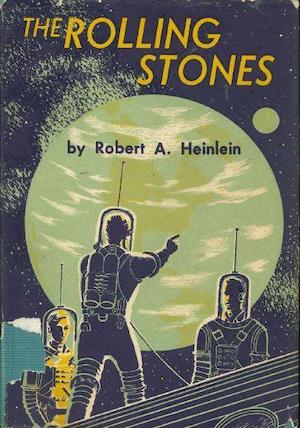
Twin brothers Castor and Pollux rebuild a used spaceship and take Mom, Dad, little brother Buster, and Grandma Hazel (a founding father of Free Luna) on a tour of the solar system. They try to sell used bicycles on Mars, accidently overpopulate their ship with Martian flat cats, and find homes for the critters among the miners of the asteroid belt. At book’s end, the family is headed out Saturn way just to take a look at the rings. Where they’re going, they don’t need roads, but it counts as a road-trip novel.
American Gods by Neil Gaiman
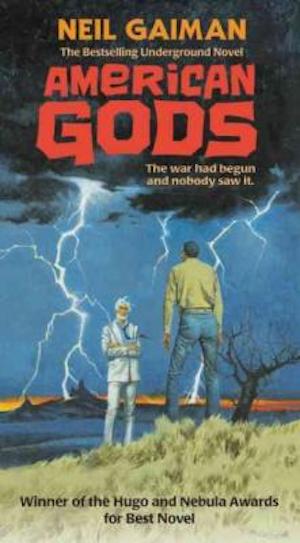
The mysterious Mr. Wednesday has an agenda, but his driver Shadow, an ex-con mourning a dead wife, is just along for the ride… at first. Dig around on the Internet and you can find itineraries and maps made so you can recreate Shadow’s own fumbling journey into godhood, starting with the House on the Rock in Wisconsin to Cairo, Illinois to Lebanon, Kansas to the World Tree near Blacksburg, Virginia to Rock City, Georgia. Be careful, the road is full of ancient conmen, sensitive deities, and leprechauns looking for a fight.
Green Lantern/Green Arrow by DC Comics
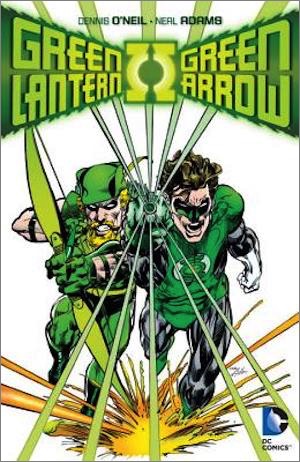
I picked up a lot of the singles during my comic-pursuing days, but you can get them as bound collections now. In the very early ‘70s, DC Comics Dennis O’Neill and Neal Adams put Hal Jordan, interstellar ring-bearing cop, into a pickup truck with Oliver Queen, counterculture archer, and sent them on a road trip into America. The duo experienced the country as they took on racism, sexism, poverty, over-population, pollution, demagoguery, and Speedy’s (Green Arrow’s protégé) heroin addiction in the days of the Nixon White House.
Ariel by Steven R. Boyett

A boy and his unicorn. Set some years after the apocalyptic Change that killed or disappeared 99 percent of humanity, a dude named Pete is wandering the American southeast just trying to stay alive when he meets a young unicorn who he can only touch because he’s a…you know. He names her Ariel, teaches her how to talk, and they become the best of friends and wander together. When the two learn there’s price on Ariel’s horn they head to Manhattan (the book changes from Road Trip to Quest) to take on an evil sorcerer. Pete meets a girl along the way, which presents its own set of problems. Sex or your best pal?
Mongrels by Stephen Graham Jones
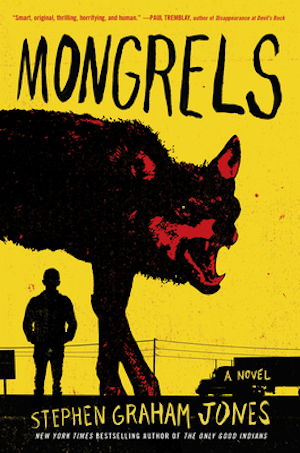
A family of werewolves lives a nomadic life in the American south, avoiding contact with a world that hates and fears them. The main character, a teen, hasn’t done the change-into-a-wolf thing yet, and uses his travel time to write a manual on werewolf life, which includes such useful tidbits as ‘empty the trash before you change, because some garbage is not digestible.’ Excellent book. I can’t recall if I ordered this list one-to-five best or five-to-one best, but Mongrels is up there somewhere.
Runners up: Taran Wanderer by Lloyd Alexander, any Star Trek: Voyager novel, 2312 by Kim Stanley Robinson, and the Saga comic by Brian K. Vaughan and Fiona Staples.
R.W.W. Greene is a New Hampshire USA writer with an MA in Fine Arts, which he exorcises in dive bars and coffee shops. He is a frequent panelist at the Boskone Science Fiction and Fantasy Convention in Boston, and his work has been in Stupefying Stories, Daily Science Fiction, New Myths, and Jersey Devil Press, among others. Greene is a past board member of the New Hampshire Writers’ Project. He keeps bees, collects typewriters, and lives with writer/artist spouse Brenda and two cats. He is is the author of The Light Years (2020) and Twenty-Five to Life (coming Aug. 24, 2021), both with Angry Robot Books, and shares too much on Twitter at @rwwgreene.










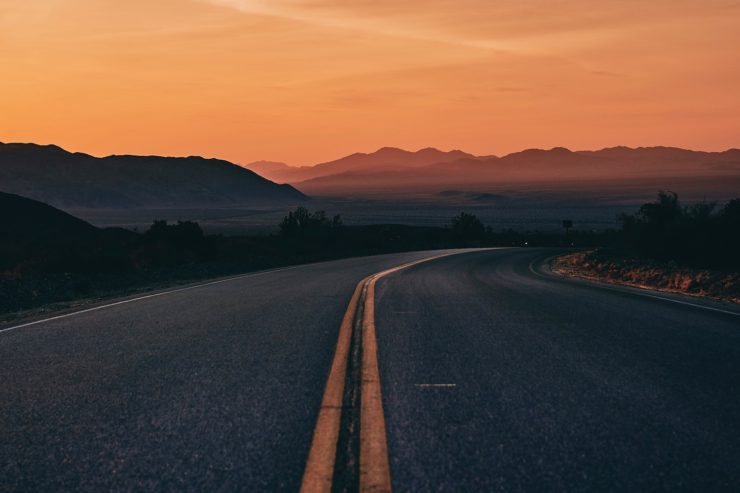
I LOVE road trips (I’ve done family road trips to Wyoming/Yellowstone, the Grand Canyon, all around both Michigan peninsulas, to Niagara Falls, to DC, and New Zealand) and so the concept of American Gods was especially fun to me. Some of these were with my family as a child/teen, and some of them with my own family as an adult.
We grew up in Michigan and the Midwest and the funny thing is I read it right after my family had come to visit me after I moved to Wisconsin and visited House on the Rock and a bunch of other things around me (I highly reccomend the Mustard Museum). We always had a softspot for finding the quirky tourist attractions so the whole idea that there is some spiritual significance cracked me up AND the fact that the climax took place there.
Seems to me that Roadmarks (1979) by Roger Zelazny doubles down on the criteria, with Randy and Red”s separate jaunts coming together before the last act. There’s even a pub scene at the end…..
I would suggest Lord Valentine’s Castle. Of course, like players in Station Eleven, the juggling troupe in LVC are traveling entertainers, but they don’t hit the same towns over and over in a well worn route. There is more wandering involved and the stops are new and wondrous to the amnesiac Lord Valentine and the reader. Once they realize the new juggler is, in fact, a deposed Coronel of Majipoor, the trip is more goal oriented.
I’d suggest the third of Bujold’s Sharing Knife books, where Dag, Fawn, and Fawn’s brother and various compatriots travel hundreds of miles downriver to reach the ocean, more or less to see what they can see.
I think Becky Chambers ‘ Monk and Robot books will fit this quite well.
@3: I remember being crazy about the Majipoor stories as a kid. I wonder how well they’ve aged.
Alan Dean Foster’s To The Vanishing Point is another good road trip book, altho it does turn from Road Trip into a Quest once the Sonderberg family finds out who their hitchiker really is and what she’s hitching towards
Does Zelazny’s Damnation Alley count?
@8 – I have to confess I had the same thought. LOL.
@8,@9
I don’t think Damnation Alley qualifies based on the definitions in the original post because the journey has a specific purpose: to deliver medicine to the destination city. It’s a quest, not a road trip.
Dan Simmon’s Hyperion comes to mind here, as does one of its inspirations, Chaucer’s The Canterbury Tales…
@@.-@, I was coming to suggest the same thing – “Passage”, the third book in Lois McMaster Bujold’s “Sharing Knife” series, mostly takes place on a flatboat voyage down the river – very deliberately patterned after the Ohio and Mississippi. The main characters are a couple who come from two different worlds, traveling in search of possibilities for bringing their two cultures together.
Helen and Troy’s Epic Romance by A. Lee Martinez
The Odyssey is mainly a road-trip, well, sea voyage, but with the goal of getting home
Rachel Hartman’s Tess of the Road— it’s right there in the title!
I would very sincerely argue that a lot of The Wheel of Time is a road trip, especially (and ironically) Rand’s narrative. He basically just wanders about from place to place meeting people for (nearly) the entirety of the novels. The other characters do this to some extent as well- hence series readers’ affectionate nickname of “The Big Slog” for those later-middle books where absolutely everyone seems to just be wandering about aimlessly.
I submit for consideration, “Glory Road”, another Heinlein. He was quite a “peripatetic” writer. <grin>
Iain M Banks “Against a Dark Background” is all road trip – and shades almost into parody – there is a scene where the protagonist drives from a highway onto a huge rolling rest stop to get some sleep… together with a snide remark about how highways replaced the railways.
Elsewhere It’s not hard to see the parallels structurally and thematically to The Odyssey – surely the original road trip story.
Most of these sound really interesting. I’d say that Nicholas Eames’s two books – “Kings of the Wyld” and “Bloody Rose” – both feel like road trip books, even though they count as quests by this article’s rules. While both books involve groups of people on the road trying to meet a goal, the books themselves are much more about the journey than the destination – it’s not the quest that makes up the story, it’s everything that happens along the way. And since they take place in a world that might as well be a D&D setting, a lot can happen on the road.
“The Witches of Karres” by James Schmitz is about getting from point A to point B. Most generation ship stories are road trip oriented. Jack Vance used road trips a lot. Hooking up with a caravan or a long sea voyage happens many times in his books. His “Space Opera” is about an interstellar opera tour. His Cugel stories are often about a long journey with interesting stops.
Zelazny’s Nine Princes in Amber starts as a road trip, and it (and the sequels) return to the “road” repeatedly.
There are also a lot of urban fantasy novels set up as, or including, road trips (Seanan McGuire’s Ghost Roads series leaps to mind), although that might be too far afield from classic SFF to count.
Long time since I read The Rolling Stones, but ‘m fairly sure there was an older sister along as well
22, Meade is regrettably easy to forget. Not least because she’s the most normal and sane member of the family rendering her fairly colorless.
Another interplanetary road story is Ports Of Call and its sequel Lurulu, by Jack Vance.
maybe in this category of going from one point to another, I remember “The Fifth Season” by Jemisin, it left that sensation on me. liked it .
How about A. E. van Vogt’s The Voyage of the Space Beagle?
Much of Prince of Thorns is a road trip; sometimes there’s a destination, but mostly the brothers are wandering looking for people to loot.
Madeleine L’Engle’s The Moon by Night is an old-fashioned, in a car, road trip.
Who needs tesseracts?